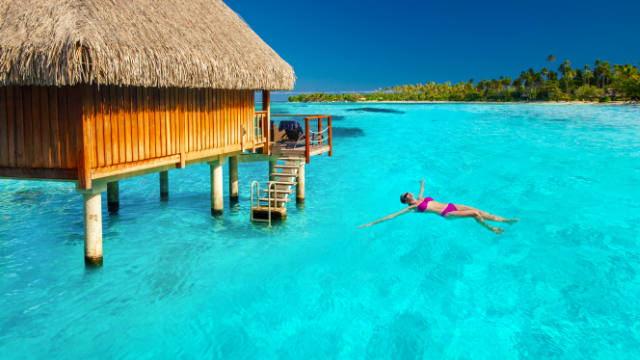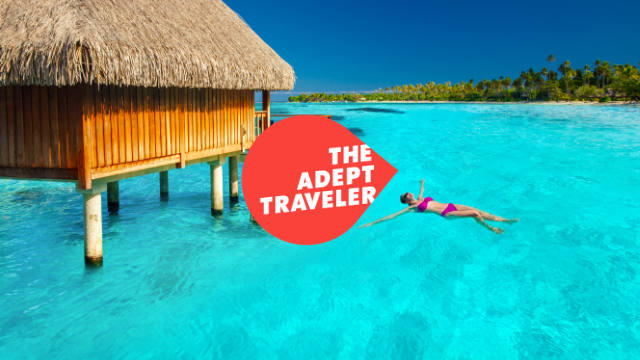French Polynesia
Nestled in the heart of the South Pacific lies French Polynesia, an ethereal wonderland that captures the soul of adventurous travelers. Imagine setting foot on these tranquil islands, where the rhythmic lull of turquoise waves whispers secrets of an untouched paradise. Here, verdant mountains rise majestically, punctuating the skyline with their dramatic peaks, while lush tropical foliage fills the air with a symphony of intoxicating floral scents. As you travel to French Polynesia, the vibrant tapestry of coral reefs beckons you to dive into their colorful embrace, where an underwater world of exotic marine life dances to the melody of the sea. The flavors of French Polynesia tantalize your taste buds with a feast of fresh seafood and tropical fruits, seasoned with the zest of island spices and the warmth of Polynesian hospitality. Whether basking under a golden sunset or exploring the cultural tapestry of its islands, French Polynesia offers an enchanting escape into a realm where beauty knows no bounds.
French Polynesia Travel Season
When considering travel to French Polynesia, selecting the best season can significantly enhance the experience. French Polynesia, famous for its breathtaking islands, turquoise waters, and vibrant marine life, offers different experiences throughout the year based on weather conditions and influx of tourists. The peak season generally occurs during the months of June to August when the weather is dry and cool. This period is marked by minimal rainfall, making it ideal for outdoor activities like snorkeling, hiking, and exquisite beach time.
While the peak season offers exceptional weather for travelers, the allure of travel to French Polynesia becomes even more enticing during the shoulder seasons. These are the months of April to May and September to October when the islands experience favorable weather characterized by mild temperatures and less humidity compared to the intense heat of the summer months. The advantage of traveling during these times is the relatively smaller crowds, allowing for a more intimate interaction with the pristine environment and local culture. Furthermore, accommodations and flight prices are often more reasonable compared to the peak season.
Travel to French Polynesia during the off-peak season, mainly from December to March, introduces travelers to a distinct side of this island paradise. Although this period coincides with the rainy season, which can be marked by heavy but brief afternoon showers, it also offers unique perks. The landscape is lush and vibrant due to the increased rainfall, and the tourist attractions and beaches are often less crowded. This period is also when travelers can witness the Heiva i Tahiti festival in July, which actually kicks off during the late wet season, featuring Polynesian dance, music, and traditional sports, adding cultural vibrancy to your travel itinerary.
Understanding the calendar of local events can also optimize travel to French Polynesia. For instance, the Hawaiki Nui Va'a, a celebrated canoe race, occurs in late October or early November, drawing competitors and spectators from around the globe. Travel during this time offers the dual benefit of moderate tourist activity and an authentic local experience. Meanwhile, Christmas and New Year’s bring their own charm with multicultural celebrations that blend Tahitian traditions and French influences.
Ultimately, determining the best time to travel to French Polynesia requires balancing ideal weather conditions against personal travel preferences for crowd size and cultural experiences. Each season provides a varied backdrop of experiences, from tranquil beaches in solitude to vibrant festivals full of cultural enrichment, ensuring that French Polynesia remains a versatile travel destination throughout the year.
The Weather and Seasons in French Polynesia
Travel to French Polynesia offers an exotic experience with its unique and dynamic weather conditions throughout the year. The region enjoys a tropical climate characterized by two primary seasons: the wet season and the dry season. Each season presents a distinct set of weather patterns, influencing what travelers might experience and when they might want to plan their visit.
The Wet Season: November to April
The wet season in French Polynesia extends from November to April. During this period, travelers can expect warm and humid conditions, with average temperatures ranging from 80°F to 86°F (27°C to 30°C). Rainfall is more frequent, particularly from December to February. This is the time when the islands witness their highest precipitation, sometimes causing brief afternoon showers or storms. Despite the rain, the lush landscapes become even more vivid, offering a unique perspective on the region's natural beauty. The humidity levels are typically higher, which might be uncomfortable for some travelers. However, the rain is usually brief and followed by sunshine, allowing for continued exploration and activities.
The Dry Season: May to October
The dry season, which spans from May to October, is generally considered the best time to travel to French Polynesia. During these months, temperatures are slightly cooler, averaging between 75°F and 82°F (24°C and 28°C). The weather is pleasantly warm with lower humidity and significantly less rainfall. This period is perfect for those seeking sun-drenched days ideal for beach activities, snorkeling, and diving in the pristine waters. The conditions are often described as idyllic, attracting travelers from all over the world. The dry season also coincides with several local events and festivals, making it a vibrant time to experience the culture of French Polynesia.
Travel Considerations and Tips
While planning travel to French Polynesia, it's essential to recognize that weather can vary between the different islands and archipelagos. The variations are generally minor, but they can influence specific activities or experiences. For instance, the Marquesas Islands may experience slightly different weather patterns due to their geographical location. Therefore, travelers are advised to check local forecasts associated with their specific destinations within French Polynesia. Packing accordingly for the season, with lightweight clothing and rain gear, ensures travelers are prepared for any weather conditions.
Travel to French Polynesia can be a rewarding experience regardless of the season, thanks to its stunning natural beauty and welcoming culture. While the dry season may offer the most favorable weather conditions for outdoor activities, the wet season provides lush, vibrant landscapes and fewer tourists, offering a more intimate experience.
Accepted Payment Methods and Other Payment Information in French Polynesia
Traveling to French Polynesia offers a captivating experience filled with stunning landscapes and rich cultural encounters. When planning your travel to this beautiful destination, it's important to understand the various payment options available to ensure a smooth journey. French Polynesia uses the CFP franc (XPF) as its local currency, which is pegged to the euro. This makes currency exchange relatively stable for travelers from the Eurozone.
If you're visiting French Polynesia, be prepared to encounter diverse payment practices across the islands. In major tourist areas like Tahiti and Bora Bora, credit card usage is widely accepted. Visa and Mastercard are the most commonly used credit cards, providing travelers with convenient transaction options at hotels, restaurants, and shops. American Express and Discover cards, however, may not be as widely accepted in French Polynesia. While some upscale establishments might accept these cards, it's always wise to carry an alternative like Visa or Mastercard to avoid inconvenience.
Travelers should also keep in mind that while credit card usage is prevalent in more developed areas, it may not be as common on smaller, more remote islands. Many local businesses may prefer cash transactions, especially in local markets or family-owned boutiques. Therefore, having some local currency on hand is advisable. ATMs are available in larger towns, allowing you to withdraw CFP francs using major international cards. However, it's crucial to inform your bank of your travel plans to French Polynesia to avoid any security blocks on your account.
Cash Usage and Tipping Etiquette
During your travel to French Polynesia, you'll notice that cash is often favored in more traditional settings. While credit cards provide convenience, cash can facilitate smoother transactions, especially in rural or less developed areas. Additionally, some smaller businesses might offer discounts for cash payments. As for tipping etiquette, it is generally not expected in French Polynesia, unlike in many Western countries. Nevertheless, if you receive exceptional service, feel free to offer a small gratuity as a gesture of appreciation.
Additional Payment Considerations
To enhance your travel experience in French Polynesia, it's important to stay informed about potential fees associated with currency exchange and international transactions when using credit cards. Some card issuers may charge foreign transaction fees, so checking the terms with your bank before your trip to French Polynesia can help you avoid unexpected costs. Moreover, always safeguard your cash and cards while exploring to ensure a stress-free travel experience in this tropical paradise.
Why You Should Travel to French Polynesia
French Polynesia is a destination that captivates the imagination, offering travelers a lush oasis of vibrant culture, stunning landscapes, and enthralling experiences. Each visit promises a journey like no other, where dreams of paradise become reality. Here's why travel to French Polynesia should be at the top of your bucket list.
Pristine Islands and Beaches
Travel to French Polynesia to discover some of the world's most pristine islands and beaches. With over 100 islands spread across five archipelagos, the destination boasts unspoiled stretches of white sand, surrounded by azure waters and lush greenery. Whether sunbathing on the tranquil beaches of Bora Bora or exploring the volcanic wonders of Tahiti, the islands offer serene settings to unwind and soak up the sun.
Unique Marine Life
The warm, crystal-clear waters of French Polynesia are home to a vibrant underwater world teeming with marine life. Travelers can dive into the reefs for close encounters with colorful fish, manta rays, and even sharks. Snorkeling in the coral gardens or participating in a guided diving excursion promises unforgettable experiences. Traveling to this destination offers unmatched opportunities for underwater exploration.
Rich Cultural Heritage
French Polynesia is steeped in a rich cultural history that dates back centuries. Visitors can explore the indigenous Polynesian traditions through local dances, music, and art forms. Immersing in the dynamic culture provides insight into the local way of life, with the welcoming Polynesian people eager to share their customs and stories. Festivals and cultural events are great ways to dive deeper into this heritage.
Exotic Cuisine
The cuisine in French Polynesia is a delightful fusion of French and Polynesian flavors. Travelers can savor dishes made with fresh seafood, tropical fruits, and locally-sourced ingredients. Dining experiences range from gourmet restaurants to cozy beachside barbecues, offering a taste for every palate. Sampling the local fare is not just about food but also about embracing the culture.
Luxurious Overwater Bungalows
Another compelling reason to visit French Polynesia is the iconic overwater bungalows that offer a unique blend of luxury and immersion in nature. Originating here, these accommodations are synonymous with romantic and idyllic getaways, providing travelers with breathtaking views, direct lagoon access, and unparalleled privacy. Staying in an overwater bungalow offers a quintessentially Polynesian experience.
Stunning Natural Landscapes
The natural beauty of French Polynesia is awe-inspiring. From the majestic peaks of Mount Otemanu in Bora Bora to the lush rainforests of Tahiti, the landscapes are diverse and dramatic. Hiking trails, such as those on Moorea, invite travelers to explore an abundance of flora and fauna, waterfalls, and panoramic vistas. The islands' topography is a traveler’s dream come true for nature and adrenaline lovers.
Water Sports and Adventures
For the adventurous traveler, French Polynesia offers a playground of water-based activities. Kite surfing, paddleboarding, and sailing are popular pastimes, while the calm lagoons provide ideal conditions for exploration. Experienced guides offer excursions that take travelers beyond the beaches, adding an element of excitement to their visit. The destination ensures adrenaline-pumping adventures for all ages.
Welcoming Local Communities
Meeting the locals is part of the charm of visiting French Polynesia. Known for their hospitality, the Polynesian people greet travelers with a warmth that makes them feel at home. Engaging with local communities, experiencing their daily life, and participating in traditional activities create a genuine connection with the culture and enhance the travel experience.
Enchanting Lagoon Cruises
A cruise around the lagoons of French Polynesia reveals hidden gems that are inaccessible by land. Whether aboard a luxury yacht or a traditional outrigger canoe, witnessing the sunset over the water and discovering secluded islands offers a sense of adventure and tranquility. Travelling through these waterways is an unforgettable highlight, giving a new perspective of the islands.
Year-Round Pleasant Climate
The tropical climate of French Polynesia makes it a perfect vacation destination any time of year. With consistent temperatures and pleasant weather conditions, travelers can enjoy outdoor activities, water sports, and beach relaxation throughout their stay. This year-round appeal ensures that anytime is a good time to travel to French Polynesia, making travel planning as flexible as it is exciting.
The History of French Polynesia
French Polynesia, a breathtaking archipelago in the South Pacific Ocean, offers a unique blend of natural beauty and rich cultural heritage, making it an enticing destination for history lovers and travelers alike. The earliest known inhabitants were Polynesians who arrived over a thousand years ago, navigating across vast ocean expanses in outrigger canoes. Their arrival marked the beginning of a vibrant civilization that would flourish on the islands, each with its own distinct history and culture. French Polynesia's history is often characterized by its lush landscapes and the spiritual significance of its natural environment, which is deeply woven into the cultural narratives of the region.
Travel to French Polynesia to immerse yourself in a tapestry of intriguing historical events. The arrival of European explorers in the 18th century, such as James Cook and Louis Antoine de Bougainville, marked a significant turning point in the history of the islands. Their expeditions opened up French Polynesia to the world, leading to increased interactions with Western powers. This culminated in the annexation of the islands by France in 1880, transforming them into a French protectorate. This period of European influence is evident today in the customs, language, and architecture across the islands, making a visit to French Polynesia a fascinating experience for those interested in colonial history.
A remarkable aspect of French Polynesia's allure is its wealth of archaeological sites and historical landmarks. Notably, the island of Raiatea, considered the cultural heart of French Polynesia, hosts the ancient Marae Taputapuatea, a UNESCO World Heritage site. This sacred site, once a central hub of Polynesian religion and power, offers intriguing insights into the spiritual practices and sociopolitical structures of the early Polynesians. Also, history lovers can travel to French Polynesia to explore the remnants of Tiki statues on the Marquesas Islands, which stand as enduring symbols of the region's artistic ingenuity and spiritual life. These sites are essential pilgrimages for those seeking a deeper understanding of Polynesian culture and history.
Travel to French Polynesia today, and you'll find a vibrant amalgamation of tradition and modernity. The islands have become a crossroads where Polynesian customs harmoniously coexist with French influence, offering an array of cultural festivals, culinary delights, and artisanal crafts that reflect this unique blend. Visitors can participate in traditional dance performances, learn about ancient navigation methods, or witness the craftsmanship in local markets. This cultural tapestry not only enriches the heritage of French Polynesia but also draws historians and cultural enthusiasts from around the globe, promising them an unforgettable journey through time.
The Culture of French Polynesia
French Polynesia, an enchanting array of islands nestled in the South Pacific, is a destination teeming with rich cultural heritage and warm, welcoming people. At the heart of French Polynesian culture is the profound respect for nature and its harmonious interaction with daily life. The locals are predominantly of Polynesian descent, with a substantial blend of European and Asian influences, creating a vibrant tapestry of traditions that invite travelers to explore and engage. When one travels to French Polynesia, they are greeted not only by the breathtaking beauty of the islands but also by the genuine hospitality of its people, known for their captivating smiles and laid-back lifestyle. The everyday customs in French Polynesia emphasize community and familial bonds, with traditional meals often being communal affairs, full of laughter and shared stories.
The cultural expressions in French Polynesia are nothing short of mesmerizing, particularly through their music, dance, and art. The traditional dance of the islands, known as 'Ori Tahiti,' is a dynamic expression of rhythm and storytelling. Visitors are often entranced by performances that narrate ancestral tales and celebrate the natural environment. Similarly, the music of French Polynesia, rooted in percussion and string instruments, provides a lively backdrop to any travel experience, often heard at local festivals. These festivals, such as the renowned Heiva i Tahiti, are vibrant spectacles celebrating culture through dance competitions, sporting events, and intricate craft displays. To travel to French Polynesia is to witness these immersive experiences that bring together old traditions and modern flair, making each visit memorable and unique.
Art in French Polynesia bears significant cultural meanings, with tattooing being one of the most revered forms. These tattoos are not merely decorative but narrate personal history, status, and social identity. Travelers to French Polynesia become aware of the importance of preserving indigenous art and culture through visits to local galleries and artisan workshops. Here, they can appreciate handcrafted jewelry, wood carvings, and traditional weaving, each piece telling a story of the island's history and the artist's personal journey. This deep appreciation for art as an expression of cultural identity resonates throughout the islands, inviting anyone who travels to French Polynesia to delve deeper into the authentic Polynesian way of life.
Preservation efforts within French Polynesia are notably focused on maintaining and fostering traditional cultural practices amidst the influences of globalization. The islands celebrate various initiatives aimed at preserving the Polynesian language, practices, and customs for future generations. There’s a deliberate effort to educate locals and travelers alike about the significance of sustaining these cultural roots. For those journeying to these islands, witnessing the balance between indigenous culture and modernity is an unparalleled experience. Undertaking a travel journey to French Polynesia is an invitation to immerse oneself in the incredible diversity and cultural richness, making it a remarkable destination awaiting discovery.
The Culinary Experience of French Polynesia
Travel to French Polynesia promises a culinary journey as mesmerizing as its turquoise lagoons and picturesque islands. This tropical paradise offers a rich blend of Polynesian, French, and Asian flavors that create an unforgettable dining experience. With influences from the native Maohi culture, travelers can expect vibrant dishes that utilize the freshest local produce, seafood, and tropical fruits. The growing tourism industry has also paved the way for international cuisines, so visitors will find a delightful array of options to satisfy their palates. From traditional meals served in lush garden settings to open-air beachside cafés, dining here is as diverse as it is delectable.
For those traveling to French Polynesia, indulging in its regional specialties is a must. Poisson cru, the national dish, is a heavenly concoction of raw fish marinated in lime juice and mixed with coconut milk and crunchy vegetables. The bold flavors of fafa, taro leaves cooked in coconut cream with chicken or pork, offer a comforting taste of the islands. The adventurous palate may also savor dishes prepared with uru (breadfruit) or ika mata, a raw fish dish similar to ceviche. Each dish narrates the island’s relationship with the sea and land, ingredients cherished by locals throughout history.
No culinary journey is complete without savories alongside unique local beverages. French Polynesia offers a fine selection of wines, reflecting its ties with France, which pairs wonderfully with seafood delicacies. Hinano beer is locally brewed, offering a refreshing lager to complement the warm island climate. Wine enthusiasts may indulge in the unique Tahiti wine, grown on volcanic rock, lending a distinctive flavor. The spirits scene features exotic concoctions like Tahitian rum, perfect for a tropical cocktail. A visit to French Polynesia’s numerous islands promises a distinct experience as each island proudly displays its culinary specialties, preferences, and local beverages weaving through its historic roots and modern living.
As travelers explore French Polynesia, the vibrant food markets offer an authentic glimpse into local life. The Papeete Market in Tahiti is a sensory overload of colors and smells, where visitors can sample exotic fruits, fresh fish, and homemade pastries. For those seeking a fine dining experience, the numerous upscale resorts boast culinary fusion delights by internationally acclaimed chefs. Dietary needs such as vegan or vegetarian options are increasingly catered to, with menus featuring innovative plant-based dishes that highlight local flavors. Moreover, seasonal dishes like banana poke, a traditional dessert, and food festivals celebrating the harvest provide tourists with an evergreen flavor adventure, ensuring that the travel to French Polynesia is a feast for the senses and the soul.
What to See and Do in French Polynesia
As you travel to French Polynesia, the mesmerizing landscapes of Bora Bora await exploration. Known as the "Pearl of the Pacific," Bora Bora's turquoise lagoon captivates every traveler. Engage in a panoramic boat tour to fully appreciate the vibrant coral reefs, teeming with marine life. Dive or snorkel to witness the beauty below the water's surface, or take a leisurely swim in the crystal-clear waters, perfect for families and solo travelers alike. With its idyllic scenery, Bora Bora is a must-see destination for anyone visiting French Polynesia.
Discover Moorea’s Breathtaking Belvedere Lookout
Travelers seeking breathtaking vistas should not miss the Belvedere Lookout in Moorea. Overlooking Cook's Bay and Opunohu Bay, this vantage point offers panoramic views that encompass the island’s lush mountains and vibrant sea. Whether you're hiking up the forested paths or taking a guided ATV tour, the lookout provides an unparalleled visual treat. The area also invites adventure seekers to explore the trails and connect with nature, making it an ideal spot for both the adventurous and those looking for serene beauty.
Cultural Immersion in Tahiti’s Papeete Market
Diving into the local culture is a significant part of travel to French Polynesia, and a visit to the bustling Papeete Market in Tahiti is an enriching experience. A myriad of stalls sell colorful pareos, fresh vanilla beans, and an assortment of local crafts. The vibrant atmosphere is a feast for the senses, with the smells of tropical fruits and freshly caught fish. Engage with locals, savor Polynesian delicacies like poisson cru, and purchase unique souvenirs. This market is a cultural gem, perfect for families and solo travelers alike.
Adventure in Tikehau’s Pristine Coral Gardens
Nestled among the Tuamotu Archipelago, Tikehau is a paradise for divers and snorkelers. Its coral gardens are renowned for their biodiversity, offering a rare glimpse into the underwater world of French Polynesia. Swim among colorful fish, manta rays, and even sharks in the gentle currents. Tikehau is less frequented by tourists, providing a serene and intimate experience with nature. Adventure seekers will relish the opportunity to explore these untouched marine environments.
Experience Polynesia’s Past at Nuku Hiva’s Archaeological Sites
Nuku Hiva, situated in the Marquesas Islands, fascinates history enthusiasts with its well-preserved archaeological sites. The island is steeped in history, featuring ancient temples and tikis that narrate the stories of its original settlers. Travelers can explore the stunning Vaipo Waterfall and the Taipivai Valley, stepping back in time to uncover the island’s rich cultural heritage. This exploration is a journey through history that captivates both solo travelers and families interested in the past.
Luxuriate in the Overwater Bungalows of Taha’a
Renowned for intimate luxury, Taha’a invites travelers seeking relaxation to indulge in its famed overwater bungalows. These accommodations offer unparalleled views and direct access to the lagoon’s warm waters. Couples will find this setting romantic, while families can enjoy the spacious living areas and serene environment. Ideal for unwinding, Taha’a’s bungalows provide a quintessential French Polynesian experience, blending luxury with the natural beauty of the islands.
Spiritual and Scenic Exploration on Raiatea’s Faaroa River
Raiatea, known as the "Sacred Island," offers spiritual and scenic beauty along the Faaroa River. As the only navigable river in French Polynesia, it provides a unique opportunity for an eco-cruise amidst lush, tropical surroundings. Paddleboarding or kayaking here allows for an immersive experience, letting travelers appreciate the island’s natural splendor at their own pace. Families and adventurous travelers will find this journey both tranquil and invigorating.
Engage in Traditional Dance and Music in Huahine
The island of Huahine boasts a vibrant cultural scene, particularly through traditional Polynesian dance and music. Attend a local performance to witness the Hura Tahiti, a captivating expression of Polynesian culture. These dances recount stories of ancient legends and are accompanied by the deep, rhythmic sounds of the pahu drum. Engaging in these cultural experiences provides travelers with a deeper understanding of Tahitian heritage, perfect for those keen on immersing themselves in the local customs of French Polynesia.
Explore Rangiroa’s Exceptional Wine and Reef Adventures
Rangiroa, one of the largest atolls in French Polynesia, offers a unique blend of experiences for those traveling to this part of the world. Famous for its local Tahitian winery, visitors can take a tour and taste wines produced from grapes grown in coral soil. The atoll is also a diving paradise; the Tiputa Pass offers thrilling drift dives, where one can encounter dolphins and a myriad of ocean life. This combination of distinctive wine and adventure makes Rangiroa an exciting destination for diverse interests.
Unwind on Maupiti’s Secret Beaches
For a truly secluded escape, consider Maupiti, a hidden gem among the Society Islands. Its untouched beaches, such as Terei’ao, offer privacy and serenity away from the crowd. The island’s small size means everything is within a short cycling or walking distance, allowing for leisurely exploration. Travelers who value peace and quiet will find Maupiti perfect for a tranquil retreat, surrounded by the pristine beauty of French Polynesia.
Tips & Tricks for Traveling in French Polynesia
Understanding Local Etiquette and Customs
While traveling to French Polynesia, understanding and respecting the local etiquette can enhance your experience significantly. Greetings are an important part of everyday life; a friendly "Ia ora na" (hello) and "Mauruuru" (thank you) will be greatly appreciated by locals. It's also customary to bring a small gift when visiting someone's home. In public spaces, dress modestly out of respect for cultural traditions, especially outside resort areas. Sundays are generally a day of rest, so expect closures of shops and attractions.
Optimal Time for Visiting French Polynesia
Choosing the right time to travel to French Polynesia can greatly influence your experience. The dry season from May to October offers pleasant weather and is ideal for activities such as hiking and diving. However, it is also the peak tourist season. For a more budget-friendly and less crowded experience, consider traveling during the shoulder months of April and November when the weather is still favorable, and costs are lower than during peak months.
Getting Around the Islands
Navigating between the islands of French Polynesia requires planning due to their scattered locations. Air travel is a popular option with Air Tahiti offering flights to most islands. Booking a multi-island pass can be economical for those planning to explore multiple islands. For a more scenic approach, consider taking a ferry, which is ideal for nearby islands like Moorea. Renting a scooter or a bicycle provides flexibility and a chance to explore at your own pace when you're on an island.
Budget-Friendly Accommodations
While French Polynesia is known for its luxury resorts, travelers on a budget have options. Consider staying in a family-run pension or guesthouse, often referred to as a "fare." These accommodations not only offer an authentic experience but are more affordable than high-end resorts. Some guesthouses include meals with your stay, providing an additional savings opportunity. Hostels in Tahiti or Moorea can also be a good choice for budget travelers looking for a social atmosphere.
Experience Local Cuisine
Diving into the culinary scene is a highlight when you travel to French Polynesia. Beyond the exquisite seafood, don’t miss trying "Poisson Cru," a local specialty that's a delightful blend of raw fish marinated in lime and coconut milk. For a truly local experience, visit food trucks known as "Roulottes" in Tahiti, which offer a variety of dishes at reasonable prices. Also, indulging in poke and tropical fruits like mangoes and papayas can satisfy your palate while supporting local vendors.
Respecting the Marine Ecosystem
The stunning marine life is a significant draw in French Polynesia, making it vital to promote responsible tourism. When snorkeling or diving, avoid touching the corals as they are delicate ecosystems. Opt for reef-safe sunscreens to prevent chemical damage to the marine life. Participating in local conservation efforts, such as beach clean-ups, is a rewarding way to give back and ensure that the natural beauty of French Polynesia is preserved for future visitors.
Cultural and Historical Exploration
Enrich your travel experience by delving into the history and culture of French Polynesia. Explore marae, which are ancient Polynesian temples found throughout the islands, particularly on Raiatea. These sites provide insight into the spiritual and social aspects of Polynesian life. Attending local festivals can also offer a lively introduction to traditional dance, music, and crafts. Engaging with community events allows an immersive experience and a deeper appreciation of the local heritage.
Travel Photography Tips
For photographers, vibrant landscapes, stunning sunsets, and marine life offer endless opportunities. The early morning and late afternoon light, known as the golden hour, provides the best lighting for capturing the vivid colors of the islands. Incorporate local elements such as coconut trees, outrigger canoes, and traditional attire to add cultural depth to your photos. Underwater cameras are a must to capture the enchanting underwater world. Always ask for permission before photographing locals to respect their privacy.
Planning for Internet Access
Internet access can be limited on some islands, so it's wise to plan accordingly. Most hotels and resorts offer Wi-Fi, but it may come with an additional charge or be offered only in common areas. Purchasing a local SIM card with a data plan can ensure connectivity across most islands. For those who require constant access, portable Wi-Fi devices can be rented upon arrival at the airport in Tahiti. Being prepared can facilitate communication and help in navigating the islands more efficiently.
Solo Traveler Safety
For solo travelers, French Polynesia is generally safe, but it's always prudent to take precautions. Inform someone about your daily plans and expected return times when venturing out. Engage with the community by staying at local guesthouses, which offer a more personalized experience and the opportunity to meet other travelers. Trustworthy local guides can enhance your exploration, especially for off-the-beaten-path adventures, ensuring a safe and enjoyable journey through this paradise.
What To Know Before You Go to French Polynesia
Travel to French Polynesia offers a breathtaking escape to the beautiful islands of the South Pacific. Known for its stunning beaches, turquoise waters, and vibrant culture, this tropical paradise is a dream destination for many. Before you embark on your journey to French Polynesia, there are essential details to consider to ensure a smooth and enjoyable trip.
Entry Requirements
Travelers heading to French Polynesia should be well-informed about the entry requirements. Citizens of many countries, including the United States and European Union members, do not require a visa for stays up to 90 days. However, a valid passport with at least six months' validity from the date of entry is mandatory. It's advisable to check with the nearest French consulate or your home country's government website to verify current visa requirements before travel.
Health Precautions
When planning your travel to French Polynesia, consider health precautions. The islands have no mandatory vaccinations, but it's wise to ensure routine vaccinations like measles, mumps, rubella (MMR), and tetanus are up to date. Some travelers opt for hepatitis A and typhoid vaccinations, particularly if you plan to explore areas with less developed sanitation. It's also recommended to have comprehensive travel insurance covering medical emergencies, as healthcare services can be expensive and may require evacuation in severe cases.
Local Customs and Etiquette
Being aware of local customs and etiquette is crucial during your travel to French Polynesia. Polynesians are known for their warmth and hospitality. It's polite to greet people with a friendly "Ia Ora na" (hello) and "Mauruuru" (thank you). Dressing modestly is appreciated, especially when visiting villages or attending local events. While swimwear is appropriate at the beach, it's respectful to cover up when leaving the beach area.
Transportation Options
Getting around in French Polynesia is part of the adventure. Inter-island travel often relies on domestic flights, given the archipelago's vast area. Tahiti's Faa'a International Airport is the main gateway, with regular flights to other islands. Ferries operate between some islands like Tahiti and Moorea, providing another scenic travel option. Renting a car or scooter is popular for exploring larger islands, while bicycles are great for smaller islands.
Tipping Culture
Travelers to French Polynesia will find that tipping is not a customary practice. The culture focuses on community and sharing; service charges are typically included in bills at restaurants and hotels. While tipping is not expected, rounding up the bill or leaving a modest token of appreciation for exceptional service is always well-received.
Communication Tips
French and Tahitian are the official languages of French Polynesia. While French is widely spoken, English is commonly used in tourist areas. Learning a few basic French or Tahitian phrases can enhance your travel experience. Polite expressions and greetings like "Bonjour" (good day) and "Nana" (goodbye) are appreciated by locals and can help bridge language gaps. Most signs and menus are in French, so having a translation app handy may be useful.
Accessibility in French Polynesia
Traveling to French Polynesia presents a unique experience, blending natural beauty and cultural richness. However, for travelers with specific accessibility needs, it’s essential to plan carefully. French Polynesia has made strides in recent years to improve its accessibility, though challenges remain. Those considering travel to this stunning Pacific paradise, particularly with mobility, visual, or auditory needs, should examine the various accessibility options available.
Physical Accessibility for Travelers with Limited Mobility
When planning travel to French Polynesia, it's important to note that accessibility for those with limited mobility or who use wheelchairs may vary significantly across the islands. Papeete, the capital city on Tahiti, offers more robust infrastructure compared to other islands, with some public spaces and accommodations being wheelchair accessible. Major hotels in the area often have rooms designed for accessibility, featuring wider doors, grab bars, and roll-in showers. However, smaller accommodations and traditional pensions may lack these facilities.
Accessible Public Transportation
The public transportation options in French Polynesia are somewhat limited, especially concerning those requiring wheelchair access. While Tahiti's capital offers a more developed network, the accessibility of buses and shuttles varies, and not all vehicles are equipped with lifts or ramps. Renting a car can be a more flexible option for accessible travel to French Polynesia, with some rental services offering vehicles with adaptive equipment upon request. Nevertheless, it's advisable to book in advance and confirm the specific needs before travel.
Visual and Auditory Accommodations
For travelers with visual or auditory impairments, travel to French Polynesia requires some preparation, as accommodations for these needs are not uniformly available across the islands. Larger hotels may offer visual and auditory assistance services, including Braille menus or visual alert systems. Portable assistive technology can be beneficial, so it's prudent for travelers to bring their own devices, ensuring seamless communication and access to information during their stay in French Polynesia.
Accessible Tourist Attractions
While French Polynesia is celebrated for its natural beauty and outdoor activities, accessibility to some tourist attractions can be limited. Certain well-visited areas, such as the beaches in Tahiti and Moorea, have made efforts to enhance accessibility with paved paths and ramps. Some tour operators offer accessible activities like boat tours equipped with boarding ramps or lifts and guides trained to assist travelers with various needs. Engaging with local tour companies in advance to confirm accessible travel arrangements is highly recommended.
French Polynesia is gradually improving its accessibility for travelers with disabilities, making efforts to ensure that everyone can enjoy its breathtaking landscapes and vibrant culture. While challenges remain, particularly in the more remote islands, careful planning and proactive communication with service providers can lead to a rewarding travel experience for all visitors to this enchanting region.
Health & Safety in French Polynesia
Travel to French Polynesia offers an enchanting escape to idyllic island settings. However, travelers should remain aware of certain safety concerns to ensure a pleasant and incident-free journey. Knowing the potential risks and taking appropriate precautions can greatly enhance the travel experience.
Water Safety
When traveling to French Polynesia, it's vital to practice water safety as the region is surrounded by the vast Pacific Ocean. The warm tropical waters can have strong currents and unexpected changes in tides, which pose potential hazards for swimmers and snorkelers. Travelers should be cautious when participating in water sports and always heed local advice and warning signs about sea conditions. Moreover, it is advisable to swim in designated areas where lifeguards are on duty.
Natural Disaster Risks
French Polynesia experiences certain natural disaster risks that travelers should be aware of. Cyclone season runs from November to April, posing a risk of tropical storms and heavy rains. Travelers should stay informed about weather forecasts during these months and follow any guidance provided by local authorities. Earthquakes are also a possibility as the region lies within the Pacific "Ring of Fire." Tourists should familiarize themselves with emergency procedures in the event of seismic activity.
Crime
French Polynesia is generally considered a safe destination with low crime rates, yet travelers should remain vigilant about petty theft, such as pickpocketing or theft from unsecured accommodations. It is recommended to keep valuables secure and to avoid displaying expensive items or large sums of money in public. Additionally, travelers should take care when using public transportation and should be mindful of their belongings in crowded places, such as markets or festivals.
Health and Safety Precautions
When travelers plan a visit to French Polynesia, they should consider certain health and safety precautions. There are no mandatory vaccinations to enter French Polynesia, but routine vaccinations such as measles, mumps, and influenza are advisable. Mosquito-borne diseases, including dengue fever, can pose a risk; thus, tourists should use insect repellent and wear long sleeves and pants when necessary. Travelers should also remember that while medical facilities in Tahiti are adequate, outer islands may have limited healthcare services. It is prudent to have comprehensive travel insurance to cover any medical expenses that may arise during your trip.
Although French Polynesia is known for its political stability, travelers should always stay informed about the current social or political climate. Engaging with locals, continuous learning about the region, and adhering to any travel advisories from the respective home country can contribute to a safe and memorable travel experience.
Other Places You Might Like
Bora Bora, French Polynesia - Those who cherish the exquisite beauty of French Polynesia will find themselves enamored with Bora Bora. This paradisiacal island boasts crystal-clear waters and lush surrounding landscapes that create an atmosphere of absolute tranquility. Flawless beaches lined with palm trees and the iconic silhouette of Mount Otemanu make it a perfect escape for relaxation, romance, and adventures such as snorkeling in vibrant coral gardens or indulging in a soothing over-water bungalow experience, much like the captivating allure that defines Travel to French Polynesia.
Maldives - The Maldives evokes a similar sense of awe and serenity as French Polynesia with their unparalleled turquoise waters and pristine white sand beaches. This tropical haven offers an abundance of underwater splendor with rich marine life, making it ideal for diving enthusiasts and leisure travelers alike. The combination of luxurious accommodations on private islands and the stunning natural environment resonates deeply with those who have been touched by the magic of French Polynesia.
Seychelles - For those seeking a destination that mirrors the enchanting beauty of French Polynesia, the Seychelles archipelago provides a stunning blend of natural beauty and charm. The islands are famous for their unique granitic boulders, lush rainforest interiors, and rich biodiversity both above and below the sea. The idyllic beaches and clear waters invite visitors to enjoy various activities such as snorkeling, diving, and hiking, echoing the spirit of adventurous relaxation found when you Travel to French Polynesia.
Phuket, Thailand - While not an island destination like French Polynesia, Phuket serves as a beguiling tropical retreat with a similar appeal. The island's vibrant culture, incredible culinary scene, and stunning natural landscapes capture the essence of paradise. With azure waters and palm-lined beaches offering breathtaking vistas, coupled with a vibrant nightlife and rich cultural experiences, Phuket provides a diverse range of activities that cater to travelers who have experienced the serene elegance of Travel to French Polynesia.
Fiji - Fiji presents itself as an alluring alternative to French Polynesia, with its collection of over 300 islands offering stunning beaches and welcoming hospitality. The Fijian islands are known for their thriving coral reefs, lushly vegetated interiors, and diverse marine life. Visitors can partake in diving, sailing, and exploring traditional Fijian villages, experiencing a similar sense of discovery and tranquility that they might find when they Travel to French Polynesia.
Mauritius - Similar to French Polynesia, Mauritius captivates travelers with its eclectic blend of beautiful beaches, vibrant culture, and adventure-filled natural landscapes. The island is known for its multicultural society, intriguing history, and fascinating French influence combined with rich Creole culture. Visitors can bask in the sun on the beautiful sandy beaches, venture into the lush inland areas, or explore the splendid marine parks. Its array of luxurious resorts and diverse experiences make it an appealing destination akin to the captivating allure of French Polynesia.
Oahu, Hawaii, USA - Those who admired the volcanic islands of French Polynesia will feel at home on the vibrant island of Oahu in Hawaii. The striking juxtaposition of lush landscapes, golden beaches, and dramatic mountains delivers unforgettable vistas and adventures. Whether surfing the famous waves of the North Shore, hiking through verdant trails, or experiencing the cultural richness of Honolulu, Oahu provides a tropical escape that mirrors the splendor and cultural charm present in French Polynesia.
Final Thoughts
Embarking on a journey to French Polynesia invites travelers into a vibrant tapestry of breathtaking natural beauty, rich cultural heritage, and once-in-a-lifetime experiences. As one gazes upon the crystal-clear lagoons, luxuriates in the idyllic overwater bungalows, or explores the lush rainforests, it becomes clear why travel to French Polynesia remains a cherished dream for many. This destination offers a unique blend of adventure and tranquility, allowing visitors to unwind on pristine beaches or dive into a world of marine wonders. The warmth and hospitality of the Polynesian people further enrich your travel experience, making every interaction memorable and heartfelt.
French Polynesia exudes an irresistible allure that captivates the hearts of travelers seeking both relaxation and excitement. Whether it's witnessing a mesmerizing sunset over the volcanic peaks of Moorea, indulging in world-class cuisine, or partaking in traditional Polynesian rituals, every moment spent here is a step into paradise. If you're planning your next exotic getaway, consider French Polynesia for a profound escape into nature's splendor and a captivating cultural journey. Travel to French Polynesia promises to be much more than a destination—it is an unforgettable story waiting to be written.
Bora Bora, French Polynesia

Marquesas, French Polynesia

Moorea, French Polynesia

Nuku Hiva, French Polynesia

Papeete, French Polynesia

Raiatea, French Polynesia

Society Islands, French Polynesia

Tahiti, French Polynesia

Tuamotus, French Polynesia

Paul Gauguin 2028 Tahiti Cruises Open With 30% Off

Hilton Caribbean Resort Sale, Book By Jan 27

2028 World Cruise From Miami To Athens With Azamara

World Cruise Dubai To Barcelona 2029 Route Announced

Windstar Doubles Tahiti Cruise Capacity in 2027

Nat Geo-Lindblad 2027-28 Voyages Span All 7 Continents

Ponant Adds Second Ship in French Polynesia for Winter 2026-27

Oceania Unveils Gérard Bertrand Wine Lunch on Allura

Holland America Unveils Five New Legendary Cruise Voyages

Discover Oceania Cruises' Festive Winter Holiday Voyages

Oceania Cruises: In-Depth Polynesian Exploration for 2025

Holland America Line's 2026 Grand Voyages: Explore the World

Windstar Unveils New Routes and Early Booking Perks

Oceania Cruises: Navigating Hidden Gems from Tahiti to the Caribbean for 2024-2025

Silversea Cruises' Unprecedented Voyage in 2026: A World Cruise Like No Other

Ultimate Cruise Experiences: Atlas Ocean Voyages' 2024 Itineraries, Oceania Cruises' Exclusive Whisky & Crystal Serenity's World Cruise

An Unforgettable Journey: Crystal Unveils 2024 World Cruise Aboard the Renovated Crystal Serenity

Travel News: French Polynesia, Las Vegas, and Walt Disney World

Paradise Reimagined: The Allure of Bora Bora Tiki Huts

